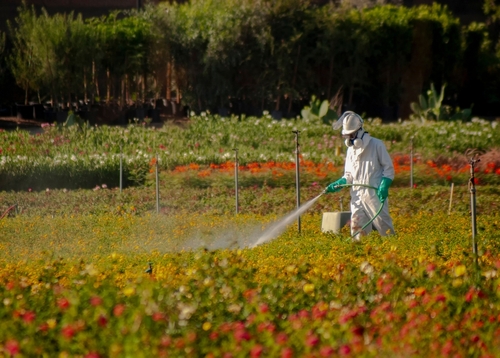
In an era where sustainable practices are increasingly prioritized, scientists have embarked on a controversial endeavor: utilizing human urine as fertilizer for growing vegetables. This practice has ignited a fascinating debate from a conservative perspective, blending issues of environmental sustainability with ethical qualms and health concerns.
At first glance, the use of human urine in agriculture might seem like an innovative loop in recycling waste into a resource. Proponents argue that it is rich in nitrogen, phosphorus, and potassium, essential nutrients that plants crave. In theory, this could reduce our reliance on chemical fertilizers, decrease agricultural runoff, and make farming more environmentally friendly.
This company is on a mission to turn your urine into fertilizer for plants🪴 pic.twitter.com/7Ua3k1vxNP
— NowThis Impact (@nowthisimpact) April 22, 2024
However, conservatives are raising significant ethical and health concerns. First and foremost are the safety implications. Can a process ensuring that harmful pathogens and pharmaceutical residues are removed from urine before its application on crops be guaranteed? The thought of consuming vegetables grown with human waste might be unpalatable to many, raising questions about public acceptance of such produce.
Moreover, there's an argument to be made about the sanctity of our food supply. Traditional values hold that certain practices are inherently undignified or disrespectful, and using waste products in food production may cross a moral boundary for some. It challenges our conventional views on cleanliness, purity, and respect for the food that sustains us.
Scientists want to grow vegetables using human urine – and reveal how YOU can make the natural fertilizer at home https://t.co/gJ99nM5HNr pic.twitter.com/RfQaKkbOp9
— Daily Mail Online (@MailOnline) April 25, 2024
On the economic front, the viability and scalability of collecting and processing human urine for agricultural use pose another set of challenges. While small-scale experiments might show promise, a conservative viewpoint might question whether this method can meaningfully contribute to global food security without imposing undue logistic and financial burdens on farmers and consumers.
There's also a broader philosophical debate about human interaction with the environment. While sustainable and regenerative agricultural practices are crucial in addressing climate change and degradation of arable land, there must be a line where we consider whether our interventions respect or undermine the natural world. Is turning human waste into food crossing that line?
Critics within the conservative camp further worry about the slippery slope of normalizing what might be deemed unnatural or untested practices. There's a cautious approach to new technologies and methods, particularly when they pertain to something as fundamental as our food. The history of agriculture is riddled with innovations that promised efficiency and sustainability but led to unforeseen negative consequences.
In conclusion, while the aim of reducing waste and promoting sustainability in agriculture is commendable, the use of human urine as fertilizer is met with considerable skepticism from a conservative standpoint.
The debate encapsulates a broader discourse on how we balance innovation with tradition, progress with caution, and environmental stewardship with ethical integrity. As research continues, it will be essential to carefully weigh these considerations and ensure that our pursuit of sustainability does not compromise our values or well-being.
What are YOUR thoughts?
We want to hear from you! Please comment below to join the discussion.













The Asian countries that grow rice have used that practice for hundreds or maybe thousands of years. It’s the “original” fertilizer.
WELL THIS IS NOTHING NEW IN THE EASTERN WORLD OF AGRICULTURE. THE KOREANS , VIETNAM FARMERS USE HUMAN AND RAW ANIMAL WASTE OR THEY DID YEARS BEFORE THESE GUYS THOUGHT THIS UP. I EXPERIENCED THIS FIRST HAND IN THEIR RICE PADDIES, 1967/ 1968 BUT THEN THEY DONT LIVE TOO LONG EITHER. AMERICAN FARMERS SPREAD ANIMAL MANURE ON FIELDS RIGHT OUT OF THE BARN STALLS. AND NOT SURE IF THEY STILL DO BUT USE DRIED HUMAN WASTE TO FERTILIZE FIELDS. HAVE TO CHECK IF THIS PRACTICE STILL GOES ON???? I FEAR THE COCTAIL OF DRUGS AMERICANS TAKE DONT GO AWAY. OUR WATER SUPPLIES HAVE DRUG RESIDUE IN THEM ALREADY. ANOTHER GOOD REASON TO GROW YOUR OWN FOOD. WHAT WE HAVE NOW ISNT VERY SAFE ALREADY.
They must be democrats! Only a depraved mind could come up with stuff like this.
My concern is whether the process of properly cleansing / purifying human urine sufficiently to completely remove all the impurities, is foolproof, ironclad guaranteed.
My question is what about the urine of persons infected with deadly, debilitating, contagious diseases ? Will their urine be harvested as well ?
And also, the actual collection, storage and transport of urine is highly complex, intractable, and volatile, subject to deliberate contamination, sabotage, poisoning, and destruction, in a manner that seriously compromises the health and safety of billions.
Unless the urine donor has a urinary infection, urine is devoid of bacteria. If it is pasteurized correctly any bacteria and viruses in the urine will be deactivated. The problem with urine is it also contains hormones that may not be deactivated. Estrogens, and progesterone, contained in hormone replacement therapy or female contraceptive products have been shown to feminize male fish in the ocean off Los Angeles due to the dumping of sewerage effluent, which has undergone both anaerobic and aerobic digestion processes in the sewerage treatment plant in LA. Urine used as fertilizer should be tested for these hormones before use. In addition many drugs are excreted in the urine and may not be degraded in the soil. Plants may take up these chemicals. Tests should be done to ensure that the urine contains ONLY nitrogen, phosphorus and potassium.